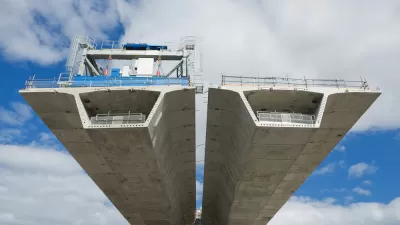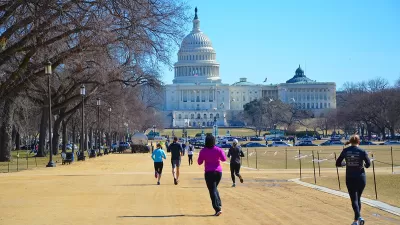The president spent Infrastructure Week touting a $1 trillion infrastructure investment plan that has yet to materialize, unlike the elimination of an essential grant program in his 2018 budget that will be detrimental to over 50 transit projects.

Infrastructure Week went off largely without a hitch, although the nation was largely captivated with the June 8 congressional hearing of fired FBI director James Comey. At each of the week's four events, Trump emphasized the importance of his $1 trillion infrastructure plan, based on $200 billion of federal investment leveraging $800 billion in private investment over 10 years.
However, like so many of the president's other priorities, the program has been distracted by the Russian cloud over the White House.
"The president...now faces an increasing probability that not only will his proposal fail in Congress but that existing infrastructure efforts will also stumble," report Damian Paletta and Mike DeBonis for The Washington Post. A Pittsburgh bus rapid transit project is cited as an example.
In previously unreported letters, officials at the Department of Transportation [DOT] last week told project managers for a bus corridor in Pittsburgh and rail projects in Phoenix and New York that the administration’s budget plan for next year “proposes no funding for new projects” under an existing federal program known as the Capital Investment Grant."
Robert Rubinstein, who received the letter as executive director of the Urban Redevelopment Authority of Pittsburgh, said the proposed cancellation of funding would effectively kill the project, which has been in the works for 10 years. It would have created an electric-bus corridor between Pittsburgh and nearby Oakland, Pa.
“We don’t have enough resources locally to undertake the larger project,” Rubinstein said. He said officials had sought roughly $80 million in federal money to go toward the $224 million project. He said the several million dollars already spent on studies and engineering reviews could be lost.
Sound familiar? Many in the transit community had seen the warning in February when the DOT deferred to approve a core capacity grant of $647 million for Caltrain electrification in the Bay Area. One reason cited was Republican opposition to the project, but in hindsight, the project might have been deferred regardless for the simple reason that Trump is unwilling to fund projects without a signed Full Funding Grant Agreement.
The phase-out of the Capital Investment Grant Program would eliminate about $2.3 billion of funding for more than 50 public transit projects, according to Andrew Brady, senior director of government affairs at the American Public Transportation Association.
"[Trump] is saying a lot of good things on infrastructure, but what he’s done is implement very real cuts to infrastructure programs,” Brady said.
Capitol Hill aides closely tracking infrastructure funding say that uncertainty over the administration’s infrastructure plans is particularly threatening to programs that are far along and are dependent on federal funding for completion.
Why?
I offer four reasons to explain why Trump wants to decimate public transit spending. It may be more likely a combination of all of them.
- Trump dislikes public transit. However, that would not explain why the Transportation Investment Generating Economic Recovery (TIGER) grant program, "created under the Obama administration in the 2009 stimulus bill and has since funded $5 billion worth of road, rail, port and bicycle projects," is also targeted by Trump for termination.
- Trump wants to have the private sector take up more of the federal government's funding role. After all, look at his infrastructure plan, which relies on 75 percent private funding.
- Similarly, Trump is taking cues from the conservative Heritage Foundation. That was the assertion made in a January post, "Trump Budget Blueprint Would Nix Federal Transit Spending." It also is consistent with their devolution principle: let the states pay for their own projects, and the success of state transportation ballot measures last November would seem to offer proof that they can do so. Furthermore, Transportation Secretary Chao was a distinguished fellow there from 2009 to 2012.
- He is cutting the transportation budget in order to pay for more defense spending as noted in a March post, "President Trump's Other Infrastructure Plan—Defunding Grant Programs."
Hat tip to Michael Keenly.
FULL STORY: Multiple transit projects across U.S. at risk as White House infrastructure plan falters

Trump Administration Could Effectively End Housing Voucher Program
Federal officials are eyeing major cuts to the Section 8 program that helps millions of low-income households pay rent.

Planetizen Federal Action Tracker
A weekly monitor of how Trump’s orders and actions are impacting planners and planning in America.

Ken Jennings Launches Transit Web Series
The Jeopardy champ wants you to ride public transit.

Driving Equity and Clean Air: California Invests in Greener School Transportation
California has awarded $500 million to fund 1,000 zero-emission school buses and chargers for educational agencies as part of its effort to reduce pollution, improve student health, and accelerate the transition to clean transportation.

Congress Moves to End Reconnecting Communities and Related Grants
The House Transportation and Infrastructure Committee moved to rescind funding for the Neighborhood Equity and Access program, which funds highway removals, freeway caps, transit projects, pedestrian infrastructure, and more.

From Throughway to Public Space: Taking Back the American Street
How the Covid-19 pandemic taught us new ways to reclaim city streets from cars.
Urban Design for Planners 1: Software Tools
This six-course series explores essential urban design concepts using open source software and equips planners with the tools they need to participate fully in the urban design process.
Planning for Universal Design
Learn the tools for implementing Universal Design in planning regulations.
Heyer Gruel & Associates PA
Ada County Highway District
Institute for Housing and Urban Development Studies (IHS)
City of Grandview
Harvard GSD Executive Education
Toledo-Lucas County Plan Commissions
Salt Lake City
NYU Wagner Graduate School of Public Service





























